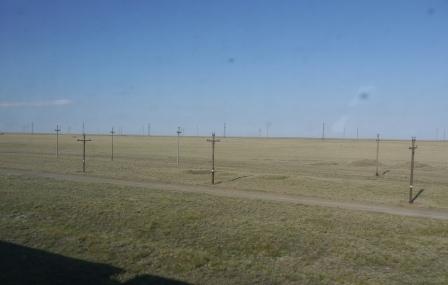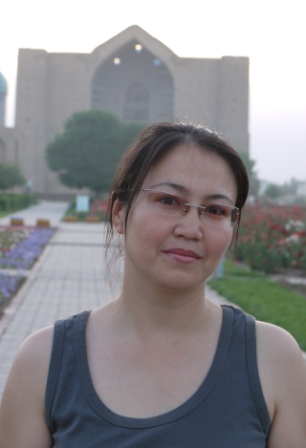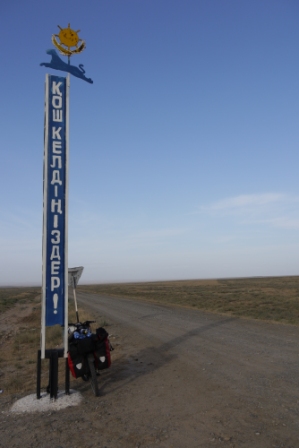
I’d joined Alexander for breakfast in the restaurant car. Borsh – Russian cabbage soup – and tea. We were sharing a sleeper cabin – a coupee – for the twenty four hour train journey from Atyrau to Kyzylorda. Very smart I suggested, air conditioned carriages, towels and bedding in pristine plastic wrappers, much better than the ageing sleepers back in England. Made in China he explained.
With each of us having just a smattering of our respective languages – Russian in his case – Alexander and I found some common ground discussing old eighties computers. He’d recently been to a convention in St Petersburg, and I explained I’d a fair sized collection of hardware at home. And even an emulator for one in my netbook.

The view out of the window had remained largely unchanged from the previous evening. Largely flat as far as one could see, the hardiest of vegetation, grasses mostly, the odd scraggy bush, an occasional tree. Arid Steppe. Inhospitable. Just an unceasing line of telegraph poles alongside the track, each seeming to pass in time with the rhythmic motion of the train. Mesmorising.
Then occasional patches of green. Wispy grasses, like strands of fine hair, flowing in the gentle breeze. A few small houses dotted around. Cultivated plots surrounded by trees. The odd camel wandering around. First sighting along the Silk Roads.
A few stops offered the chance to step off the train and wander along the platform. Colourful stalls. Later on, closer to our destination Kyzylorda, women selling dried Aral Sea fish in the afternoon sun, a light breeze making it quite pleasant. Even the routine Police check onboard was, it turned out, uneventful. The officer appeared to have a look of consternation when inspecting our papers. But no, explained Alexander when he’d gone, it was just that all of us, the Policeman included, shared exactly the same day and month of birth.
Most of our fellow passengers seemed to be families, except for three carriages at the rear, between the coupées and the baggage car where I’d secured Emma. Young conscripts off to join the Army. Their families and girlfriends packed on to the platform the previous evening to wave them off. Much cheering and bravado. But now quiet, calm, as we meandered across the Steppe. Just the odd old lady wandering past, offering newspapers or a few other sundries.
Such serenity was in marked contrast to the previous day. By mid-morning I was beset by my first bout of traveller’s diarrhoea, dreading the thought of twenty four hours couped up in a train, camped in what I feared would be a very dubious toilet. I toyed with delaying my departure but quickly discovered there wouldn’t be another space for almost a week. And that would throw my plans for crossing Kazakhstan into turmoil. So, tonight’s train it would have to be.
In a series of brief forays from my lodgings, waiting for the medication to begin to, well… err stem the flow I suppose, I stocked up on a few essentials. Some more tablets to help make the journey bearable, plenty of water and lots of extra re-hydration salts. My phrase book didn’t really extend to dealing with such situations, so I’d had to rely on a bit of acting. Pleased I was the only customer in the pharmacy.
I’d allowed plenty of time to ride from my lodgings to the railway station, just in case of a puncture, or under the circumstances, the odd rapid detour down a side road. In the end, the journey passed without event, and I was able to board the sleeper quite early. But not as early as I thought. Quite convinced I’d been in the correct time zone in Atyrau, the train nevertheless departed an hour earlier than I’d expected. Bemused, I could only imagine that as Kazakhstan has two zones, perhaps, to avoid confusion, the timetables stuck with one. But not the one I was in.
[With thanks to the Oxford Handbook of Expedition and Wilderness Medicine and James at Travel Health Consultancy – www.travelhealthconsultancy.co.uk – for guidance on diagnosis and treatment, and my brother Steve for practical, reassuring advice]







